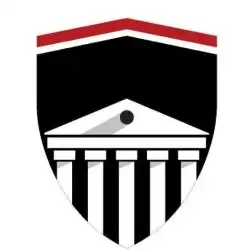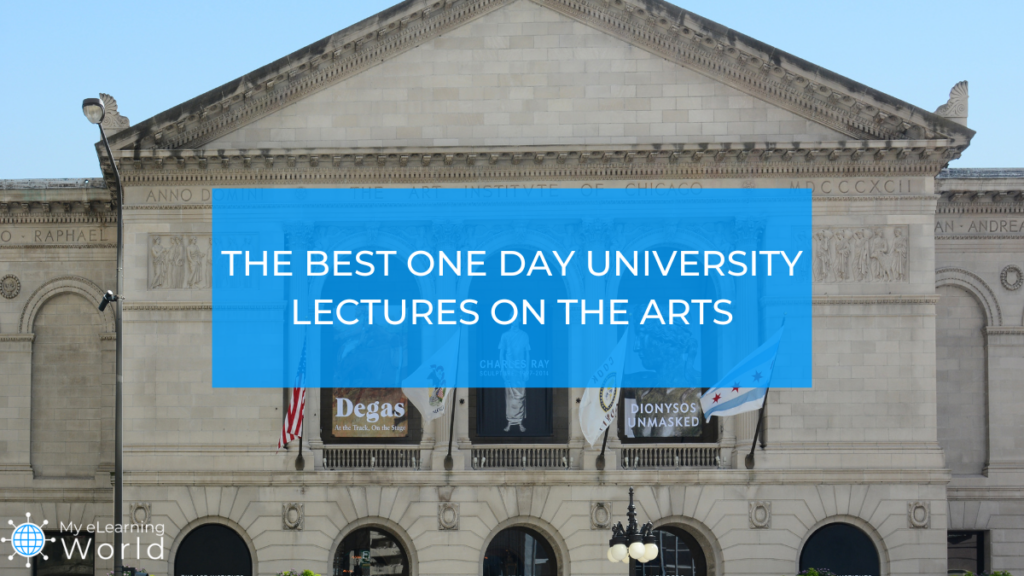Art transforms humans. It forces us to transcend beyond basic survival, encouraging us to create just for the sake of expressing and building a meaningful experience.
In recognition of the extraordinary impact of art, One Day University offers a curated selection of captivating art lectures taught by some of the world’s best professors from top universities. Each offers a unique opportunity to explore the depths of artistic expression and its transformative significance in our lives.
In the guide below, we’ve chosen 7 of our favorite art lectures on One Day University. You can access all of these classes and more with a One Day University membership.
Dive into these captivating lectures, expand your knowledge, and ignite your imagination. Let the world of art unfold before you, opening doors to new perspectives, enriching your understanding of the human experience, and leaving you inspired to explore the depths of creativity.
Disclosure: Some of the links in this article are affiliate links, meaning at no additional cost for you, we might get a commission if you click the link and purchase.
Our Favorite One Day University Lectures on The Arts
1. Vincent Van Gogh: His Art and Life
 Vincent Van Gogh: His Art and Life (One Day University)
Vincent Van Gogh: His Art and Life (One Day University)
Art historian Matthew Palczynski's insightful lecture looks at how Van Gogh's art and letters demonstrate his immense psychological understanding, solidifying his position as one of the most psychologically insightful artists in history.
In the video lecture “Vincent Van Gogh: His Art and Life,” art historian Matthew Palczynski explores the renowned artist’s work by delving into the intricacies of his existence. Palczynski adeptly uncovers the soul-stirring allure that Van Gogh’s art holds.
The lecture illuminates Van Gogh’s acute observation skills through his iconic depictions of flowers and trees, showcasing his deep contemplation of nature. Furthermore, Palczynski skillfully demonstrates how Van Gogh’s portraits and architectural subjects reflect the philosophical ideas that occupied the artist’s mind.
By examining Van Gogh’s artistic choices and subjects, Palczynski reveals the artist’s profound contemplation of his connection to others and his place in the broader world.
The lecture explores how these portraits provide windows into Van Gogh’s empathetic exploration of human relationships and his yearning for deeper connections
Palczynski’s incorporation of Van Gogh’s letters adds a personal touch to the presentation. He offers unique insights into the artist’s mindset. The lecture comes to life with a rich array of visuals, showcasing diverse examples of Van Gogh’s work and accompanied by carefully chosen excerpts from his letters. This multi-dimensional approach enables viewers to develop a comprehensive understanding of Van Gogh’s life and artistic brilliance.
Click here to learn more about this course.
2. Masterpieces of Art that Changed All the Rules
 Masterpieces of Art that Changed All the Rules (One Day University)
Masterpieces of Art that Changed All the Rules (One Day University)
In this lecture, the instructor analyzes a select few remarkable objects from the Western cultural heritage, such as paintings, sculpture, and architecture. These objects come from various countries and cover a period of over two thousand years.
Art has a remarkable ability to transcend time. It offers us a window into different eras and cultures and shapes our understanding of history and our place within it. In “Masterpieces of Art that Changed All the Rules,” presented by Denise Budd, we learn the transformative power of art. Budd, an esteemed educator at Columbia University, brings her expertise and infectious passion for art to shed light on extraordinary works that go beyond documentation and revolutionize our perception of the world.
Budd selects a diverse range of artworks spanning over two millennia. – from the ancient marvels of the Parthenon to the awe-inspiring sculptures of Auguste Rodin, and from the Renaissance masterpieces of Masaccio to the enigmatic brilliance of Diego Velázquez’s “Las Meninas”.
Rather than merely depicting their subjects, these masterpieces are about the experience of the viewer. They challenge our preconceived notions and reshape our understanding of the world.
With boundless energy and a clever approach, Professor Budd unravels the hidden depths of each artwork, revealing insights that leave us in awe. Her creative and humorous connections between seemingly disparate pieces of architecture, art, and sculpture grab our attention, compelling us to delve deeper into the revolutionary nature of these masterpieces.
In the lecture, Professor Budd’s infectious enthusiasm makes every phrase and slide captivating, drawing us into the world of these transformative artworks. Through her engaging and personal style, she imparts a wealth of knowledge and uncovers the revolutionary qualities that make these works truly exceptional.
Click here to learn more about this course.
3. Why Is Classical Music So Important?
 Why Is Classical Music So Important? (One Day University)
Why Is Classical Music So Important? (One Day University)
This lecture explores the importance and cultural impact of classical music in an enlightening, engaging manner.
In the realm of artistic expression, it is important to remember that music holds a significant place alongside other art forms.
In the engaging video lecture titled “Why Is Classical Music So Important?” presented by Leon Botstein, we embark on a thought-provoking exploration of the profound significance of classical music. As President of Bard College and Music Director of the American Symphony Orchestra, Botstein brings a wealth of knowledge and a fresh perspective to this captivating discussion.
From the outset, Botstein captivates our attention by highlighting the unique nature of music as an art form. He eloquently emphasizes that music serves no specific purpose but instead reminds us of the boundless power of human imagination. It exists purely to awaken our senses and provoke contemplation. By delving into the existential and ethical dimensions of classical music, Botstein underscores its ability to evoke our deepest emotions and foster a greater appreciation for the diversity and dignity of others.
Botstein deftly addresses the criticisms often levied against classical music, debunking the notion that it is exclusively for an elite few. He highlights the rich history and enduring appeal of classical music, citing its cultural impact, the creation of iconic venues like Lincoln Center, and the enduring popularity of classical records. Through his insightful analysis, Botstein challenges preconceived notions and invites us to recognize the enduring importance and relevance of classical music in our lives.
President Botstein’s expertise and passion shine through in this lecture, making it a captivating experience for music enthusiasts and novices alike. His ability to articulate complex ideas with clarity and depth is commendable. By exploring the profound value of classical music, Botstein fosters a greater understanding of its transformative power and why it continues to captivate audiences across generations.
Click here to learn more about this course.
4. How Music Shapes the Brain
 How Music Shapes the Brain (One Day University)
How Music Shapes the Brain (One Day University)
Dr. Indre Viskontas, who is both a neuroscientist and an opera singer/director, demonstrates in this course how music can have a significant impact on our brain function, aid in our recovery from pain, and enhance our sense of community.
Music holds the power to reshape our brains and touch our souls. In the video lecture titled “How Music Shapes the Brain,” presented by the accomplished neuroscientist and opera singer/director, Dr. Indre Viskontas, we unravel the intricate connection between music and our neural pathways. With her unique blend of scientific expertise and musical prowess, Dr Viskontas takes us on a mesmerizing exploration of the potential of music.
From the outset, Dr Viskontas captivates our attention by highlighting the extraordinary impact of music on our brain’s plasticity. Whether we are musicians or avid listeners, our brain undergoes remarkable changes as it enters rhythms and responds to the rise and fall of musical notes.
Through her expertise, she reveals the incredible ways in which music influences our brainwaves and activity. And even neurochemistry, offering a deeper understanding of why music has such a profound effect on our emotions and well-being.
Dr. Viskontas goes beyond the scientific aspects and touches upon the humanistic dimensions of music. She explores how music has the enchanting ability to unite people. Even in the face of adversity such as a pandemic. It serves as a powerful force that transcends boundaries and strengthens communities, reminding us of our shared humanity.
Throughout the lecture, Dr. Viskontas sparks thought-provoking questions about the strategic use of music to improve our lives, the insights it provides into the human experience, and the qualities that make certain compositions truly extraordinary. Her engaging delivery and ability to seamlessly merge scientific knowledge. The musical passion makes this lecture a captivating and enlightening experience.
Click here to learn more about this course.
5. What’s So Great About Ballet?
 What s So Great About Ballet? (One Day University)
What s So Great About Ballet? (One Day University)
During this lecture, Harvard's Thomas Kelly will explain the connections between various ballet terms like plié, pirouette, etc., and their corresponding dance movements. Additionally, the talk will cover the origin of ballet and its place in the history of theater and opera.
In the world of ballet, movement becomes a sublime form of artistic expression. “What’s So Great About Ballet?” presented by the esteemed Professor Tom Kelly, learn the beauty, history, and significance of this mesmerizing art form.
From the very beginning, Professor Kelly captures our imagination with his profound understanding of ballet as a global performing art. As a former Chair of the Harvard Music Department and a distinguished lecturer at The Juilliard School, his expertise shines through as he unravels the intricacies of ballet and its connection to theater and opera. By delving into the origins and evolution of ballet, he unveils the rich tapestry of history that has shaped this captivating art form.
Through his insightful explanations and captivating video clips, Professor Kelly brings to life the essence of ballet, showcasing its breathtaking athleticism and enduring artistry. He not only acquaints us with recognizable ballet terms like plié and pirouette but also provides a deeper understanding of the profound emotions and narratives conveyed through dance.
The lecture is a perfect blend of education and inspiration. Professor Kelly’s engaging presentation style, combined with his extensive knowledge, immerses us in the world of ballet, leaving us with a newfound appreciation for the artistry and skill of ballet dancers.
Whether you are a ballet enthusiast or a curious observer, this lecture will undoubtedly ignite your passion for this captivating art form.
Click here to learn more about this course.
6. What Makes Great Movies Great?
 What Makes Great Movies Great? (One Day University)
What Makes Great Movies Great? (One Day University)
In this presentation, Marc Lapadula, a Senior Lecturer in the Film Studies Program at Yale University, will showcase exceptional cinematic achievements achieved through technical innovations and intricate thematic development.
In cinema, the magic of storytelling unfolds on the silver screen. What Makes Great Movies Great?” presented by the esteemed Marc Lapadula, we explore the artistry and genius behind some of the most unforgettable films in history.
As the lights dim and the projector whirs to life, Lapadula takes us on a cinematic journey that transcends mere entertainment. With his deep understanding and passion for film, he unveils the hidden layers of meaning and artistic ambitions that lie beneath the surface of great movies.
Drawing upon his expertise as a Senior Lecturer in the Film Studies Program at Yale University, Lapadula illuminates the technical innovation and thematic complexities that make these films true masterpieces.
With each carefully selected example, we are transported into a world of cinematic brilliance. From Preston Sturges’ thought-provoking “Sullivan’s Travels” to Francis Ford Coppola’s epic “The Godfather Parts I & II,” Lapadula demonstrates how these visionary directors skillfully blend genre conventions with profound subtext, creating a tapestry of storytelling that captivates and challenges audiences.
Through his insightful analysis, Lapadula invites us to look beyond the glossy surface of these films and unravel the intricate layers of meaning they contain. He delves into the art of cinematography, the power of performances, and the delicate balance between technical prowess and thematic resonance.
Click here to learn more about this course.
7. Six Essential Films With Truly Great Writing
 Six Essential Films With Truly Great Writing (One Day University)
Six Essential Films With Truly Great Writing (One Day University)
Yale Film Professor Marc Lapadula delivers a presentation showcasing 6 selected films to highlight their unique greatness. Clips will be shown and discussed to provide a memorable experience.
Witness how the significance of the storytelling appears on the silver screen. “Six Essential Films With Truly Great Writing,” presented by the renowned Marc Lapadula, celebrates the artistry and impact of exceptional screenplays.
The art of writing, in all its forms, holds an extraordinary power to transport us to new worlds, evoke profound emotions, and challenge our perspectives. When this artistry meets the medium of cinema, it creates a potent fusion that leaves an indelible mark on our collective consciousness.
Lapadula, a Senior Lecturer in the Film Studies Program at Yale University, takes us on a cinematic odyssey through six remarkable films that exemplify the pinnacle of storytelling through the written word.
With his keen insight and deep appreciation for the craft, Lapadula unravels the narrative construction, character development, and solid plotlines that make these films truly memorable. Through carefully selected clips and thoughtful analysis, he showcases how these masterpieces come to life through the synergy of writing and filmmaking.
From the thought-provoking social commentary of “Gentleman’s Agreement” to the razor-sharp dialogue in “A Few Good Men,” Lapadula’s presentation illuminates the brilliance and impact of exceptional screenplays. These films, including “Rain Man” and “The Devil Wears Prada,” serve as a testament to the profound influence that well-crafted writing can have on our cinematic experiences.
“Six Essential Films With Truly Great Writing” is a testament to the enduring art of storytelling in the realm of cinema. Lapadula’s expertise and passion shine through as he delves into the nuances of these exceptional screenplays, showcasing the artistry and impact that can be achieved through the written word. This lecture is a must-watch for film enthusiasts, aspiring writers, and anyone who appreciates the remarkable interplay between writing and the world of movies. Prepare to be inspired, enlightened, and captivated by the remarkable stories that unfold through the magic of truly great writing.
Click here to learn more about this course.
Final Thoughts
Whether you’re a seasoned art aficionado or simply curious about expanding your horizons, these lectures offer a gateway to deeper understanding and appreciation. One Day University has a selection of thought-provoking lectures that will transport you into the realm of art, music, and cinema.
The esteemed lecturers bring their expertise and passion to the virtual stage, sharing their insights and sparking conversations that will stay with you long after the final credits roll. So, grab a cup of your favorite beverage, settle into your comfiest chair, and embark on an intellectual adventure like no other.
The best part? One Day University is incredibly affordable. Plans start at $8.95 monthly or you can save big with an annual plan for just $89 a year or a two-year plan for only $139 every other year (works out to just over $5 a month).
Click here to start your membership today or check out our One Day University review to learn more.



